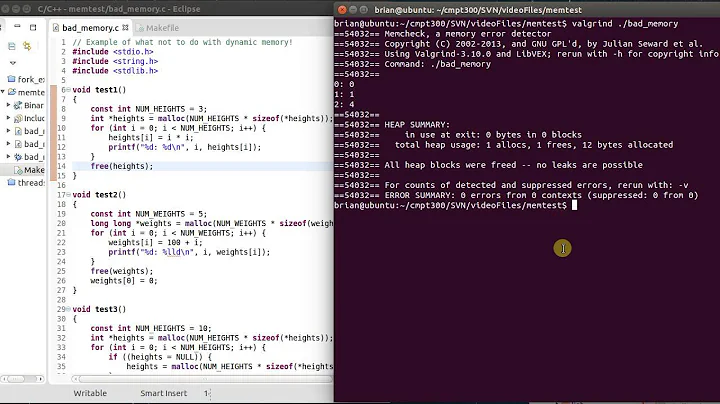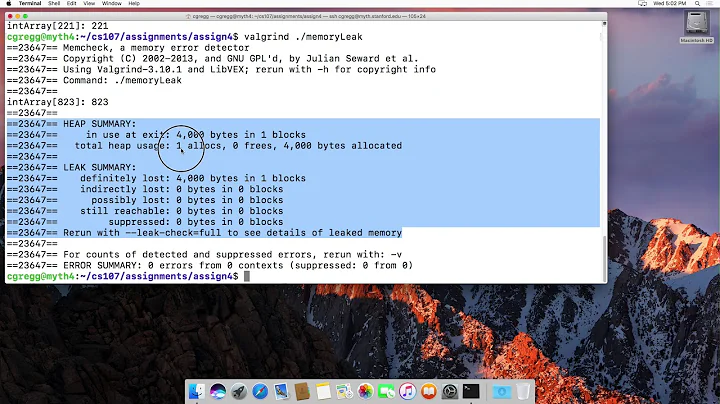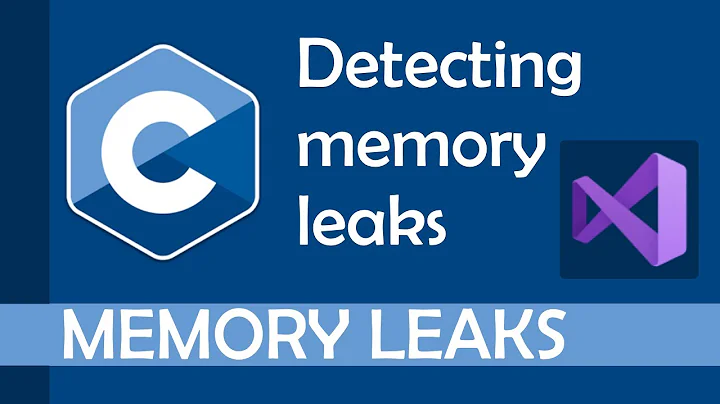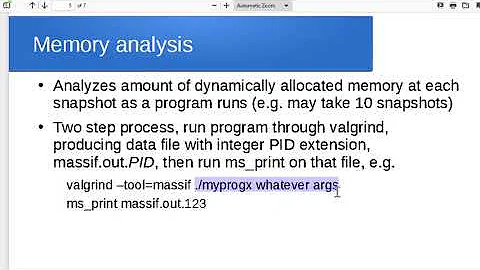Is there a good Valgrind substitute for Windows?
Solution 1
Some more good commercial tools:
Solution 2
As jakobengblom2 pointed out, valgrind has a suit of tools. Depending which one you are talking about there are different windows counter parts. I will only mention OSS or free tools here.
1. MemCheck:
Dr. Memory. It is a relatively new tool, works very well on Windows 7. My favorite feature is that it groups the same leaks' allocation stacks in the report.
http://code.google.com/p/drmemory/
I have also used UMDH( http://support.microsoft.com/kb/268343 ) and found it quiet useful and easy to setup. It works from Win2000 to Win7.
AppVerifier is a must have swissknife for windows native code developers, its "memory" checker does similar job http://msdn.microsoft.com/en-us/library/dd371695%28v=vs.85%29.aspx
2. Callgrind:
My favorite is verysleepy ( http://www.codersnotes.com/sleepy ) It is tiny but very useful and easy to use.
If you need more features, AMD CodeAnalyst™ Performance Analyzer is free: http://developer.amd.com/documentation/videos/pages/introductiontoamdcodeanalystperformanceanalyzer.aspx
Windows Performance Analysis tools is free from Microsoft, not very easy to use but can get the job done if you are willing to spend the time. http://blogs.microsoft.co.il/blogs/sasha/archive/2008/03/15/xperf-windows-performance-toolkit.aspx Download: http://msdn.microsoft.com/en-us/performance/cc752957
3. Massif:
Similar(not quite exact match) free tools on windows are:
VMMap from sysinternals : http://technet.microsoft.com/en-us/sysinternals/dd535533
!heap command in windbg : http://hacksoflife.blogspot.com/2009/06/heap-debugging-memoryresource-leak-with.html
4. Cachegrind:
Above mentioned Windows Performance Tools has certain level of L2 cache miss profiling capability but not quite as good and easy to use as Cachegrind.
5. DRD:
Haven't found anything free and as powerful on Windows yet, the only free tool for windows I can find that is slightly close is the "lock" checker in AppVerifier: http://msdn.microsoft.com/en-us/library/dd371695%28v=vs.85%29.aspx
Solution 3
Why not use Valgrind + Wine to debug your Windows app? See http://wiki.winehq.org/Wine_and_Valgrind
(Chromium uses this to check the Windows version for memory errors; see build.chromium.org and look at the experimental or memory waterfalls, and search for wine.)
There's also Dr. Memory, see dynamorio.org/drmemory.html
Solution 4
For Visual C++, try Visual Leak Detector. When I used it, it detected a memory leak from a new call and returned the actual line in source code of the leak. The latest release can be found at http://vld.codeplex.com/.
Solution 5
i would like to list some tool , hope will be useful
read this article for more detail
- Purify
- Bounds Checker
- Coverity (basically its a code analyzer but, it will catch memory leak in static )
- Glow Code
- dmalloc
- ccmalloc
- NJAMD
- YAMD
- Valgrind
- mpatrol
- Insure++
Related videos on Youtube
Drake
Masters student in Information Security. I program in C, C++, Java, Perl and currently learning the ins and outs of Objective-C and iPhone development.
Updated on January 25, 2020Comments
-
Drake over 4 years
I was looking into Valgrind to help improve my C coding/debugging when I discovered it is only for Linux - I have no other need or interest in moving my OS to Linux so I was wondering if there is a equally good program for Windows.
-
jakobengblom2 over 14 yearsWhat kinds of debugging are you looking to do? Valgrind is quite a rich toolset, and the answers below point in all kinds of directions. With an emphasis on memory leak/allocation debugging.
-
Liran Orevi over 14 yearsMaybe you can test the code on a virtual Linux machine inside your Windows, just when you need to check it. you can share the development folder between the virtual and non-virtual machine. that is, if the code is portable enough.
-
-
Norman Ramsey over 15 yearsPurify: venerable but still useful, as shown by how many changes of corporate ownership it has survived!
-
EvilTeach over 15 yearsExpensive yes. It paid back in one weekend, just using the profiler piece.
-
user9665 about 15 yearsIt is of very little practical use. It will log the filename/linenumber for offending allocations, but it's only informative if you call malloc directly. When using new/delete, it will unhelpfully pinpoint new.h as the "offending" code.
-
Rodrigo about 15 yearsIt works correctly for me, pointing the right line even new/delete are used.
-
David Rodríguez - dribeas over 14 yearsNot really free... but I guess you could find a test license for testing purposes.
-
Bob over 14 yearsI'd defintitely recommend glowcode. I've used it in the past to find an memory leak within a dll being called by my app.
-
Calyth over 14 yearsThere were complaints of major slowdowns while using DevPartner at my last workplace. They do everything to avoid using it because of how slow it would be.
-
Alex Budovski over 14 yearsBut will it work if a library function allocates? E.g. strdup.
-
 John Dibling over 14 yearsBecause then you wouldn't be debugging a Windows app - you'd be debugging a Linux app.
John Dibling over 14 yearsBecause then you wouldn't be debugging a Windows app - you'd be debugging a Linux app. -
Dan Kegel about 14 yearsNo need to recompile in Wine. Just transfer your .exe and .pdb over to a Linux box. And you wouldn't be debugging a Linux app; you're debugging your exact Windows app.
-
the_mandrill almost 14 yearsPageheap/gflags have helped me get to the bottom of some nasty heap corruption problems.
-
C.J. almost 14 yearsThe Debug CRT, which is what you are trying to describe is useful for C code. Getting it to work for C++ code is more problematic.
-
C.J. almost 14 yearsInsure++ takes forever to instrument your code, and forever to execute your code at runtime.
-
Synetech over 13 yearsIt does not seem to work for me. I even tried creating a simple project that did basically nothing other than to allocated some memory and not free it. VLD did not detect it. :-|
-
dwj over 13 yearsDead link as of 2011-02-04 for BoundsChecker.
-
relaxxx about 13 years@Synetech inc. I had the same problem in VS2010... Using the newest version of VLD solved my problem
-
 ideasman42 over 12 yearsValdrind does a lot more then find memory leaks, I mainly use it to find use of freed and uninitialized stack and heap memory which can be incredibly hard to debug otherwise.
ideasman42 over 12 yearsValdrind does a lot more then find memory leaks, I mainly use it to find use of freed and uninitialized stack and heap memory which can be incredibly hard to debug otherwise. -
Crashworks over 12 yearsThat's how most games do it. But it's a huge undertaking and a lot of instrumentation.
-
alexr about 12 yearsThere's also gperftools (formerly Google PerfTools). It's not a valgrind replacement (what is really) but it has a new malloc, cpu profiler, heap profiler and checker. Worth a look as it's support on Linux and Windows (inc Mingw) and other unices.
-
KindDragon about 12 years@user9665 Visual Leak Detector (vld.codeplex.com) provide full callstack for each memory leak with minimal souce code changes. Check example on site
-
Jarekczek over 11 yearsI found
gflags+gdb(from mingw) helpful in diagnosis.








